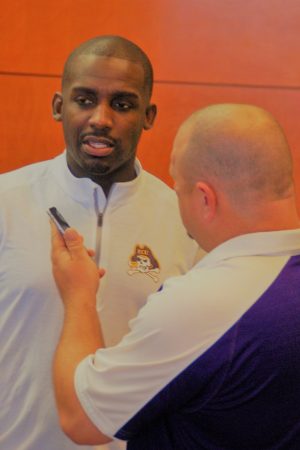It’s widely believed that a college athlete’s most meaningful improvement takes place between his freshman and sophomore seasons.
That may or may not be the case with coaches, too.
For East Carolina’s Scottie Montgomery, there’s no denying the fact that he’ll be better at what he does in 2017 because of the experience he gained a year ago in his first opportunity at leading a team of his own.
That’s not to say Montgomery did a bad job or made a multitude of rookie mistakes in his Pirates’ debut. It’s just that after having been through a season as a head coach, especially one in which things didn’t go exactly as planned, he has a much better idea of what to expect this time around.
“Just imagine getting your [driver’s] license and in that first year, you also get 100 different cars to try to figure out how to drive,” Montgomery said Saturday at ECU’s annual media day event. “That’s what we did.
“Last year we spent all of March and April just trying to learn names. This year those guys are over at your house and we have great relationships with them instead of studying the media guide to find out who they are. Now we’ve got a lot of trust between these coaches and these players. Last year was a hard transition. This year it’s just about ball and it feels really good.”

The difference has been noticeable during the opening week of preseason camp.
Instead of using up valuable practice time getting to know one another and installing the basics, Montgomery and his players have been able to jump right in and begin working on things that will actually make a difference once the season begins.
That includes a new defensive scheme the ECU coach believes will be a better fit for the personnel on hand. And yet, even as he oversees the transition from the old 3-4 alignment to a revamped 4-2-5, Montgomery’s experience last season has helped him understand that it takes more than just Xs and Os to build a winning team.
“The biggest thing I learned is that you’ve got to be a great listener,” he said. “I’m as detailed and on point as anybody. We do things a certain way. Our system is our system, but you also have to take time to sit down and listen to your kids because our kids go through things in life. When you get so caught up in running a program, you misplace your time and you do your kids a disservice. That doesn’t help your program.”
Senior linebacker Jordan Williams said he and his teammates have already noticed the difference in the way their coach relates to them.
“I feel like he’s trying to win the players over,” Williams said. “He was a great coach last year, but now he’s family oriented. Guys really want to play for him.”
Getting to know his players, along with their respective strengths and weaknesses, is a definite step in the right direction. But it’s only a small part of the reason why Montgomery is so confident in his ability to turn things around and steer the Pirates back in the right direction.
Among the most eye-opening lessons he learned during last year’s 3-9 disappointment is the unforgiving nature of ECU’s current scheduling philosophy.
Running the gauntlet of N.C. State, South Carolina and Virginia Tech before embarking on his first trip around the American Athletic Conference taught Montgomery that a major upgrade in talent was needed in order to survive a 2017 nonconference schedule that has been rated as the most difficult in the nation.
“Right then, immediately, I knew what it was going to take for us to do what was most important for us, the AAC title,” Montgomery said. “I know what it’s going to take to get there.”
Realizing that the incoming recruits in his first two recruiting classes were still too inexperienced to handle such a challenge, Montgomery sought out proven veterans to bridge the gap and address the Pirates’ areas of greatest need.
The influx of graduate transfers included immediate help for ECU’s nonexistent pass rush (Gaelin Elmore from Minnesota), anemic running attack (Tyshon Dye from Clemson) and a secondary prone to giving up big plays (Korrin Wiggins, also from Clemson), along with important stopgaps at quarterback (Thomas Sirk from Duke) and punter (Austin Barnes from Eastern Michigan).
Now that those improved pieces are in place, it’s up to Montgomery to give them the best chance to succeed. That means looking inward and taking stock in both the things he did well during his rookie season as a head coach and those areas in which he can get better.
Not all coaches have the ability to make that kind of critical self-evaluation. But according to offensive coordinator Tony Petersen, that’s one of the things Montgomery does best.
“If he does something and he feels like he made a little mistake or didn’t do something the right way, he’s not afraid to admit to himself, ‘hey, that’s probably not the best way, so I’m going to improve on it and get better,’” Petersen said of his boss. “He continually gets better at everything he does. I think he’s going to do great things.”
Leave a Reply